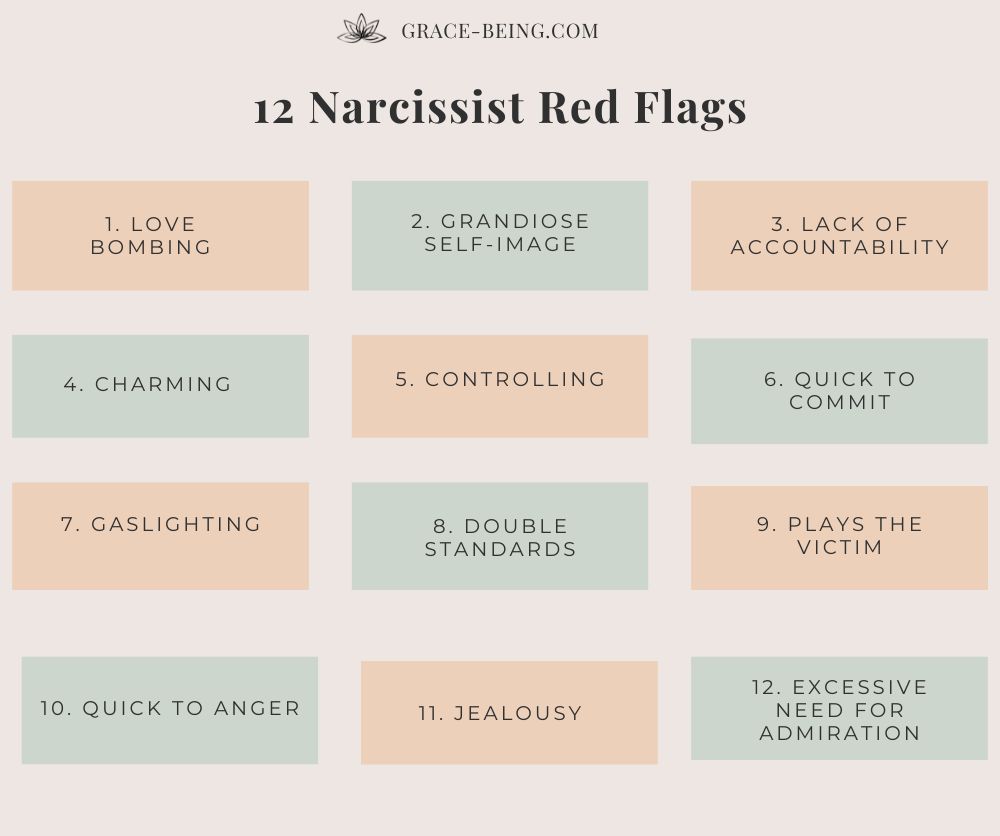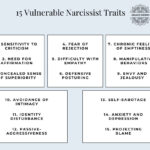35 Narcissist Red Flags – What are the Red Flags of a Narcissist?
Understanding narcissist red flags is important to understand if you’re in a narcissistic relationship. I know this sometimes can be confusing and you might not be sure whether your partner is a narcissist or not.
You’re wondering: “What are the red flags of a narcissist?”
From my own personal experience, I can tell you that they’re not always easy to spot and often come disguised as charm or charisma. In this blog post we’ll delve into the distinctive 35 red flags of narcissistic relationships.
If you’re struggling to heal from narcissistic abuse, I warmly welcome you to my Narcissistic Abuse Recovery Program. It’s an easy self-paced online course which you can do at your own pace. My signature program combines scientific and spiritual tools for holistic healing of the body, mind, and spirit.
35 Narcissist Red Flags
When you first start dating someone, it can be difficult to detect if the person is a narcissist. To make things worse, a narcissist usually engages in love bombing, which makes it even more difficult and confusing to identify whether the person is being genuinely nice or not.
Let’s examine the following 35 narcissist red flags to help you identify narcissistic behaviors and hidden motives:
1. Love Bombing:
While it’s entirely normal to experience intense chemistry at the beginning of a relationship, love bombing presents itself differently. These overwhelming expressions of affection and attention from a narcissist can feel akin to an obsession.
They might seem almost too good to be true, to the point where it becomes overpowering rather than thrilling. This intensity can start to trigger your intuition, suggesting that something isn’t quite right.
So, even as you find yourself wrapped in the narcissist’s seemingly undivided attention, it’s crucial to pay heed to your gut feelings. Don’t allow the allure of constant admiration to blind you.
Recognize love bombing for what it truly is: a manipulation technique designed to make you dependent on the narcissist’s validation and thereby easier to control.
Related: Narcissist Memes
2. Grandiose Self-Image:
A characteristic on the narcissist checklist is the presence of an inflated, grandiose self-perception. Narcissists view themselves as superior and more important than others. This quality creates an ego-centric universe where they are the central and most significant figure. This often leads to unreasonable expectations and demands from those around them.
For example, a narcissist might expect their partner to always prioritize their needs and plans, even at the expense of the partner’s own interests or commitments. They might react with disdain or anger if they aren’t always the center of attention or their needs aren’t immediately met.
This relentless self-focus and expectation of special treatment is another clear narcissistic red flag.
3. Lack of Accountability:
Refusing to take responsibility for their actions or mistakes is a huge one on the narcissist red flag checklist. Narcissists are prone to shift blame onto others in order to maintain their inflated self-image. This lack of accountability provides a convenient escape from confronting their shortcomings and enables the perpetuation of their harmful behavior patterns.
For example, reflect on their approach to promises. A narcissist might frequently make grand promises, whether in personal or professional contexts, to create an image of reliability or generosity.
However, when they inevitably fail to deliver on these commitments, they will not take responsibility. Instead, they might blame external circumstances, or worse, other people. They might also claim that someone else’s actions prevented them from fulfilling their promise.
This evasion of accountability not only shields the narcissist’s self-image but also confuses and frustrates those around them, creating a dynamic where the narcissist is never at fault.
Recognizing this pattern of blame-shifting and evasion is vital to identifying narcissistic behavior cycles and safeguarding your own emotional wellbeing.
4. Charming:
Understanding how to deal with a narcissist begins with recognizing their often-deceptive charm. Narcissists can be incredibly charismatic, utilizing their allure as a smokescreen to obscure their true intentions and behaviors. This magnetism can pull you in, making it difficult to see their narcissistic tendencies until they have gained your trust and established control.
Take, for example, a charismatic leader in a corporate setting. Narcissists often gravitate towards roles that offer power and prestige, such as CEO positions, high-level management, or influential public-facing roles.
These individuals may use their charm to cultivate an image of dynamism and confidence, attracting followers and admirers. However, behind this charismatic façade, they may engage in manipulative practices, exploiting others for personal gain, and shirking responsibility for failures or mistakes.
Similarly, in social settings, a narcissist might be the life of the party, charming and engaging, drawing people to them with their seemingly magnetic personality. Yet, this charm often serves as a tool for manipulation, hiding their disregard for others’ feelings and their constant need for admiration and control.
Understanding this deceptive charm is an essential step in learning how to deal with a narcissist. Seeing the charisma and charm as one of the many warning signs on the narcissist red flags checklist enables you to see beyond their allure and identify their manipulative behaviors.
5. Controlling:
Exerting a dominating presence in relationships is a typical narcissistic red flag. They frequently impose their views about how others should act, feel, or think. This behavior is an attempt to uphold their sense of superiority and avert any perceived threats to their self-esteem or authority.
One subtle yet potent way a narcissist may seek to maintain control is through the silent treatment. This involves withholding communication or affection to manipulate their target into feeling guilt, anxiety, or insecurity.
For instance, after a disagreement, a narcissist might refuse to engage in conversation or offer any emotional connection, creating a tense atmosphere. This isolating tactic forces the other party into a state of worry and self-doubt, questioning their actions and often capitulating to the narcissist’s desires just to restore normalcy.
Related: Things Covert Narcissists Say
6. Quick to Commit:
Narcissists often rush into commitments, seeking to quickly secure their partners in the relationship. They may push for exclusive labels, moving in together, or even talk about long-term plans early on. This rapid escalation can initially feel flattering, as it seems like a sign of their intense devotion.
However, it’s essential to recognize that for a narcissist, this is often a calculated strategy to trap you in the relationship. By fast-tracking commitment, they aim to create a sense of obligation and make it harder for you to leave when the red flags begin to become more obvious.
It’s crucial to stay mindful of this manipulation tactic and maintain a healthy level of skepticism, allowing yourself the time and space to truly evaluate the dynamics of the relationship.
7. Entitlement:
One of the pronounced narcissism red flags is a strong sense of entitlement. Narcissists often feel they deserve special treatment and privileges, irrespective of the impact on others. This leads to a profound disrespect for other people’s boundaries, and they often disregard the needs and feelings of others.
For instance, in romantic relationships, a narcissist might demand an excessive amount of your time, ignoring your personal needs or responsibilities. They may show little respect for your privacy or make decisions affecting both of you without your input.
In a family context, a narcissistic family member might take over family gatherings, imposing their preferences on everyone without considering others’ wishes. They might disregard your requests for space or intrude on your personal life without invitation.
When it comes to friendships, a narcissist might expect you to always be available for them, disregarding your own schedule or commitments. They may consistently ask for favors without reciprocating or showing appreciation. Such blatant disregard for boundaries and persistent sense of entitlement are classic red flags of narcissism.
Related: Do Narcissists Feel Guilt?
8. Gaslighting:
Gaslighting is one of the 12 traits of a narcissist. It’s a form of psychological manipulation that involves making you question your own memory, perception, or sanity. This insidious tactic sows seeds of self-doubt, undermining your confidence and shaking your faith in your own judgement.
As your certainty erodes, you become more susceptible to their influence and control. Such calculated mind games are specifically designed to disorient and subdue, reinforcing the narcissist’s position of power in the relationship and reducing your ability to challenge their behaviors effectively.
Let’s have a look at this scenario to help you put narcissist gaslighting into context:
You confront a narcissist about an insensitive comment they made at dinner, which hurt your feelings. Instead of acknowledging their mistake, they might respond with something like, “I never said that,” or “You’re too sensitive,” or even “You’re misremembering things again.”
This is gaslighting! The narcissist is attempting to distort your reality by denying the occurrence of the event or by blaming your emotional response. Over time, such tactics can lead to you doubting your own memory, perception, and emotional responses, thus strengthening the narcissist’s control over you.
9. Frequent Lies:
Consistent dishonesty is a key trait among narcissists. Recognizing these narcissist red flags is essential for self-protection. From minor details to significant matters, they weave a complex web of deception that’s hard to untangle.
This constant untruthfulness creates a fog of confusion and mistrust, leaving you unsure of where you stand. It’s a manipulative tactic designed to keep you off-balance and questioning your own judgement.
It also conveniently obscures the narcissist’s true intentions or actions, making it harder for you to hold them accountable or challenge their behavior effectively.
Related: Weird Things Covert Narcissists Do
10. Lack of Empathy:
One of the prominent red flags of a narcissist is their lack of empathy. Narcissists often struggle to connect with others on an emotional level, showing a lack of understanding and regard for other people’s feelings. This can lead to harsh criticism, dismissiveness, and callousness, as they prioritize their own feelings over those of others.
For example, if you were to confide in a narcissist about a difficult day at work, instead of offering comfort or understanding, they might respond dismissively. They usually belittle your problems or turn the conversation towards their own experiences.
This habit of invalidating others’ feelings and shifting focus back to themselves is a classic demonstration of a narcissist’s lack of empathy and a clear warning sign of their self-centered perspective.
11. Exploitative:
One of the many narcissist red flags is their readiness to exploit others without any guilt or remorse, all in the pursuit of meeting their own needs or personal gain. Narcissists view relationships as transactional rather than emotional connections. They perceive relationships and individuals as means to their own ends.
Consider, for example, if you have a wide circle of influential contacts or a high social status, a narcissist might form a relationship with you purely to gain access to these benefits. They may name-drop, use your reputation to advance their own standing, or exploit your connections without considering how it may impact you.
Alternatively, they might take advantage of your kindness or willingness to help. For instance, they may consistently ask for favors, always promising to reciprocate but never doing so. They could consistently borrow money with no intention of paying it back, or impose upon your time and resources without showing gratitude or respect.
Such exploitative behavior leaves the victims feeling hurt and used by the narcissist. By time, the relationship is drained of its warmth and trust and becomes a tool for the narcissist’s convenience.
12. Manipulative:
Narcissists are skilled manipulators, deftly twisting situations to their benefit. They masterfully employ a range of emotional tools, including charm, guilt, fear, and more to control individuals and outcomes.
In a work context, for instance, a narcissistic colleague might use charm to gain favor with superiors, painting a picture of themselves as the indispensable team member. If a project fails, they may manipulate the situation, casting blame on others and playing the victim to escape accountability.
In family dynamics, a narcissist might leverage guilt to maintain control. They could insist that family members are obliged to meet their demands because “family owes each other.” They may create an atmosphere of fear or tension that discourages family members from challenging their behavior.
Within romantic relationships, narcissists often manipulate their partners to keep them off-balance. They might shower you with affection one moment, then withdraw it the next, creating a sense of insecurity. They may provoke jealousy or use gaslighting techniques to sow doubt and ensure you’re continually striving for their approval.
Spotting these manipulation tactics across various aspects of life can be challenging, but it’s crucial in recognizing the extent of a narcissist’s control and taking steps to protect your emotional wellbeing.
13. Excessive Need for Admiration:
Narcissists have an insatiable appetite for praise and recognition. It fuels their inflated self-view and sense of superiority. Their excessive need for admiration can manifest in various ways and can become highly taxing for those around them.
For instance, in a romantic relationship, a narcissist might constantly demand compliments and reassurances from their partner. They may insist on being praised for even the most ordinary actions. Additionally, they may become upset if their partner doesn’t express sufficient admiration for their accomplishments, however minor.
In a work setting, a narcissistic colleague might constantly seek validation, requiring recognition for their contributions. If they see that others are receiving more attention or praise, they become jealous and frustrated. As a result, they might engage in excessive self-promotion, rarely missing an opportunity to highlight their achievements or abilities.
Even in social settings, narcissists might monopolize conversations, steering the focus towards their accomplishments, interests, or experiences. They may frequently post on social media seeking likes, comments, and shares as a form of validation.
14. Jealousy:
Another typical narcissist red flag is grappling with feelings of envy. These sentiments can spark a range of behaviors, from controlling tendencies to resentment when others gain success or recognition.
For example, in a workplace setting, a narcissist might become jealous when a colleague earns a promotion or praise. Their fragile ego finds this challenging to handle, leading them to criticize or belittle the colleague’s achievement, casting it as undeserved or insignificant. This tactic serves to reinforce their own perceived superiority and manage their insecurity.
The common thread in these examples is the narcissist’s need to protect their fragile ego, projecting their own feelings of envy onto others and tearing others down to maintain their own sense of superiority.
15. Quick to Anger:
Narcissists often demonstrate a low threshold for criticism or perceived slights. They typically respond with disproportionate anger or hostility. Whether it’s a minor disagreement or a well-intentioned piece of advice, a narcissist may interpret such instances as personal attacks. This threatens their self-perceived superiority.
Their intense reactions serve a dual purpose. Firstly, they reassert their dominance, reminding others of their perceived power and control. Secondly, they function as a deterrent against future criticisms, as people may become fearful of provoking such responses.
For example, in a work context, a narcissistic manager might react harshly to constructive feedback. They lash out at the provider or shift blame instead of acknowledging any areas for improvement. This kind of behavior can create a stifling environment where team members hesitate to voice opinions or concerns.
16. Plays the Victim:
Playing the victim is a major narcissist red flag! By adopting the role of the victim, they deflect blame, generate sympathy, and manipulate others into offering support or validation. They also manage to escape accountability for their actions.
For instance, in a romantic relationship, a narcissist might twist an argument, painting themselves as the wounded party, even if they were the instigator. They use this tactic to elicit their partner’s sympathy and guilt. This way they divert the conversation away from their misbehavior and toward their partner’s perceived shortcomings.
17. Double Standards:
Narcissists frequently exhibit a double standard in their interactions. They set expectations for others that they themselves choose not to follow. This behavior not only bolsters their feelings of superiority and entitlement but also serves to keep others in a subordinate position.
For instance, in a professional environment, a narcissistic boss might demand punctuality and criticize latecomers while consistently arriving late to meetings themselves. They might expect employees to work overtime while they leave early, rationalizing their behavior as a privilege of their position.
Among friends or family, narcissists might expect constant availability and attention, yet fail to reciprocate when others need support. These double standards further highlight the narcissist’s sense of entitlement and disregard for fairness or reciprocity.
18. Sense of Perfection:
Narcissism red flags include perceiving themselves as faultless while remaining hypercritical of others’ shortcomings and errors. This skewed perspective forms the basis of a toxic environment where judgement and criticism become the norm.
For instance, a narcissist might nitpick their partner’s every action, from the way they cook to how they dress, while refusing to accept any feedback about their own behavior. This constant scrutiny can erode their partner’s self-esteem and create an atmosphere of constant anxiety.
19. Frequent Interruptions:
Narcissists often interrupt or talk over others to dominate conversations, disregarding the thoughts or feelings of others. This highlights their lack of respect for others and their need to be the center of attention.
They typically interrupt or monopolize conversations, deeming their own experiences and opinions more valuable. When another individual starts talking to them, they show impatience or disinterest making the other person feel inferior, rejected, and unworthy of their attention.
20. Belittling Humor:
Sarcasm or “teasing” is a typical narcissism red flag. They engage in this behavior as a covert means to demean and belittle others, often disguising their insults as humor. When someone takes offense, they dismiss it as over-sensitivity.
They deny responsibility and shift the blame onto the person they targeted. This manipulation tactic serves to lower others’ self-esteem while allowing the narcissist to evade accountability.
For instance, in a romantic relationship, a narcissist might make sarcastic remarks about their partner’s appearance or intelligence, passing them off as jokes. If their partner expresses hurt or offense, the narcissist may respond with statements like, “Can’t you take a joke?” or “You’re too sensitive.” This dismissal invalidates the partner’s feelings while reinforcing the narcissist’s power dynamic.
21. Inconsistent Behavior:
Narcissists can show wildly varying behavior, being charming one minute and cold the next. This unpredictability can destabilize relationships, keeping those around them on their toes and causing emotional stress.
For instance, in a romantic relationship, a narcissist can display extreme mood swings, shifting between charming and cold behaviors. One moment, they might shower their partner with affection, compliments, and gifts, creating a euphoric experience. However, without warning, they can abruptly become distant, dismissive, or even hostile. This leaves their partner confused and emotionally drained.
Additionally, this unpredictable behavior can contribute to the development of trauma bonding. Through intermittent positive reinforcement, the narcissist creates a rollercoaster-like dynamic, where moments of affection and kindness are sporadically interspersed among periods of detachment or mistreatment.
This inconsistent reinforcement reinforces a cycle of hope and uncertainty, keeping the victim emotionally invested and seeking validation from the narcissist. Over time, this creates a powerful bond that can be difficult to break, even in the face of ongoing emotional stress and instability.
22. Twists Conversations:
One of the prominent narcissist red flags is their tendency to consistently steer conversations back to themselves or their own interests. This self-centered conversation style highlights their insatiable need for attention and their lack of consideration for others’ experiences or feelings.
This self-centered conversation style is a telling sign of a narcissistic individual, as it showcases their incessant craving for attention and their inherent disregard for others’ thoughts and feelings.
23. Neglectful:
Frequently exhibiting dismissiveness and neglect towards others’ needs and feelings, is a major narcissist red flag. They typically prioritize their own desires above all else. This lack of consideration can leave individuals feeling undervalued and unimportant within the relationship.
For instance, when seeking assistance or requesting a favor, a narcissist may refuse to help or reciprocate, showing little regard for the other person’s needs or requests. If they do agree reluctantly, they may throw tantrums, create conflicts, or make the person regret ever asking for their support.
This manipulative behavior aims to maintain control and ensure that their own agenda remains the priority, leaving the other person feeling neglected and emotionally drained.
24. Competitive:
Another hallmark of narcissistic behavior is their strong need to be perceived as the best in various aspects of life. This drive for superiority fuels their inclination to constantly compare themselves favorably against others.
This competitiveness sets the stage for a toxic culture of one-upmanship and continuous comparison. As a result they undermine the self-esteem and confidence of those in their orbit.
25. Disregards Others’ Feelings:
One of the most painful narcissist red flags is their apparent lack of interest or dismissiveness towards others’ feelings and experiences.
This disinterest serves as a stark reminder of their self-centered perspective, as they prioritize their own needs and desires above those of others.
Their limited capacity for empathy further reinforces their self-focused nature.
26. Sees Others as Extensions of Themselves:
Narcissists tend to perceive others as mere extensions of themselves. They disregard the autonomy and individuality of others.
This mindset results in controlling behavior, as they seek to mold and shape those around them to conform to their own desires and expectations.
They view relationships as opportunities to exert dominance and control rather than as partnerships based on mutual respect and understanding.
27. Unrealistic Expectations:
One of the many typical narcissist red flags is holding lofty and unrealistic expectations of those around them.
These expectations can be demanding and unattainable, placing immense pressure on others.
When individuals inevitably fall short of these standards, it can result in feelings of inadequacy, self-doubt, and a continuous cycle of trying to meet impossible benchmarks. Typically, they make others never feel good enough, no matter how hard they try to please them.
28. Guilt-Tripping:
Narcissists are masters at using guilt as a manipulative tool to coerce others into complying with their demands or fulfilling their needs. This insidious tactic instills a sense of obligation and confusion, as individuals find themselves caught in a web of guilt-tripping.
It is important to recognize this behavior as one of many narcissist red flags, as it can have a detrimental impact on one’s emotional well-being and autonomy.
Related: Healing from Narcissistic Abuse
29. Constantly Needs to Win Arguments:
A narcissist’s desire for superiority and control often drives them to extreme lengths when engaged in arguments or conflicts. They are not simply interested in reaching a fair resolution or understanding different perspectives; their primary goal is to win at all costs. This is also evident when divorcing a narcissist, as the make it very difficult for their partner to separate from them.
In their pursuit of victory, a narcissist may resort to distorting facts, manipulating information, or even creating a completely false narrative to support their position. This relentless determination to be right further underscores their deep-rooted need for control and dominance, disregarding the truth and the well-being of others in the process.
30. Refusal to Acknowledge Wrongdoing:
Good luck trying to get a narcissist to admit to their wrong-doing. Narcissists have an uncanny ability to deflect and avoid accepting blame, even in the face of overwhelming evidence.
They will go to great lengths to shift responsibility onto others, distort the truth, or engage in gaslighting to make you doubt your own perceptions.
This denial not only hinders personal growth and self-reflection but also perpetuates their unhealthy behavior patterns, as they continue to evade accountability for their actions.
31. Devaluation:
After the initial phase of idealization, the shift in a narcissistic relationship can be profoundly painful. This shift is known as the narcissistic abuse cycle. The once adoring partner now experiences the devaluation stage, where the narcissist starts to criticize, belittle, or demean them.
This change can be sudden and bewildering, leaving the partner feeling emotionally wounded and confused. The narcissist may undermine their accomplishments, mock their interests, or make them question their worth.
This devaluation is often accompanied by a withdrawal of affection and intimacy, creating an atmosphere of emotional distance. It is during this phase that the true dynamics of the relationship become more apparent. This phase highlights the destructive patterns and the impact of the narcissist’s behavior on the partner’s self-esteem and well-being.
32. Isolates You From Others:
If a narcissist attempts to isolate you from friends or family, know that it’s one of the main narcissist red flags that you need to look out for. This manipulative tactic serves to increase your dependence on them while diminishing your support network.
By isolating you, the narcissist gains greater control over your thoughts, emotions, and actions. You may feel trapped, unsupported, and unable to seek help or recognize the abuse.
Recognizing this narcissism red flag is crucial in protecting your well-being and regaining your independence. It’s important to reach out to trusted individuals who can provide the support and perspective needed to break free from the toxic grip of a narcissistic relationship.
33. Inflating Achievements
Inflating their achievements, often exaggerating or fabricating accomplishments is a typical narcissism red flag to fuel their sense of superiority. They may overstate their abilities, talents, or experiences to impress others and maintain an image of grandiosity. This behavior serves as a red flag of their need for constant validation and admiration.
One example of how narcissists inflate their achievements is through embellishing their professional success. For instance, a narcissistic coworker may exaggerate their role in a project, taking credit for the work of others or claiming accomplishments that are unsubstantiated.
They may fabricate details about their accomplishments, credentials, or influence within the organization, all in an effort to project an image of superiority and gain admiration from colleagues. This inflated self-image allows them to maintain a false sense of grandiosity while diminishing the achievements of others in order to elevate themselves.
34. Possessiveness
Possessiveness is another red flag of a narcissist in romantic relationships. While it may initially seem flattering, it is important to recognize that possessiveness is not a healthy attribute.
Narcissists may display controlling behaviors fueled by jealousy, seeking to restrict their partner’s interactions and activities. They might become overly suspicious, questioning their partner’s loyalty, and interpreting innocent situations as threats to their control.
This possessiveness stems from their deep-seated insecurities and the desire to maintain a tight grip on their partner’s life. It is crucial to establish boundaries and prioritize individual freedom and autonomy in a healthy relationship.
35. Erratic Behavior
Erratic behavior in narcissists can also manifest as a disregard for rules, boundaries, or even the law. They may engage in reckless or impulsive actions without considering the consequences or the impact on others. For instance, a narcissist may habitually break rules at work, showing a lack of respect for authority or company policies.
They might also engage in deceitful behaviors, such as cheating on their partner or engaging in unethical practices to further their own interests. This pattern of erratic and boundary-crossing behavior demonstrates their sense of entitlement and their willingness to prioritize their desires above societal norms or the well-being of others.
Recognizing the Narcissist Red Flags
Identifying narcissist red flags is crucial for protecting your emotional well-being and establishing healthy boundaries in relationships. From love bombing to gaslighting, possessiveness to erratic behavior, these warning signs provide valuable insights into the manipulative and self-centered nature of narcissists.
By understanding these red flags, you can navigate relationships more effectively, knowing when to set boundaries, seek support, or even make the difficult decision to disengage from toxic dynamics.
To learn more on narcissist behavioral traits, red flags, and characteristics, join me in my mini-course:
FAQs
The main 5 narcissist red flags out of the 35 warning signs listed in this article are:
1. Love bombing: excessive praise and attention early on.
2. Gaslighting: undermining your perception and reality.
3. Consistent dishonesty: weaving a web of deception.
4. Lack of empathy: disregard for others’ feelings.
5. Grandiose self-perception: believing they are superior.
The 5 main habits of a narcissist are:
1. Inflating achievements: exaggerating or fabricating accomplishments.
2. Manipulation: using charm, guilt, or fear to control others.
3. Double standards: applying different rules for themselves and others.
4. Playing the victim: deflecting blame and seeking sympathy.
5. Lack of accountability: avoiding responsibility for their actions.
Five of the main narcissism red flags in a boyfriend are:
1. Possessiveness and control, driven by jealousy.
2. Erratic behavior: unpredictable mood swings and actions.
3. Isolation: attempting to cut off support networks.
4. Using charm and manipulation to exploit others.
5. Dismissive of others’ needs and feelings, prioritizing their own.
My Related Services:
–Narcissistic Abuse Recovery Program: Join a structured program that provides tools, resources, and guidance to help you navigate and heal from the impact of narcissistic abuse.
–Email Advice: Get guidance, insights, and support directly to your inbox.







